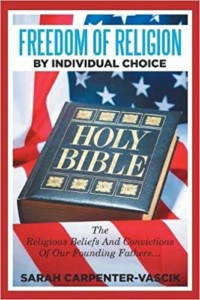
Title: Freedom of Religion by Individual Choice
Author: Sarah Carpenter-Vascik
Publisher: Westwood Books Publishing
ISBN: 978-1948653596
Pages: 304
Genre: Religion
Reviewed by: Lisa Brown-Gilbert
Pacific Book Review
Delivering an impactful, multifaceted, exploration of the principle of religious freedom, Sarah Carpenter-Vascik’s Freedom of Religion by individual Choice poses an authoritative narrative, which delves deeply into the concept from mixed standpoints, meanwhile attempting to pinpoint the answer to the essential query; did the founding fathers of the United States intend for America to be a solely Christian country?
As a reverend and scholar in varying aspects of religious study, author Carpenter -Vascik approaches the subject with detailed academic authenticity and authority. Aptly disseminates her examination of the role of religion in America’s history and its effects, the influences on the founding fathers, as well as exploring the ultimate notion, of the right to pursue the religion of your personal choosing without government interference.
At the outset, author Carpenter-Vascik devotes the early chapters to examining an intriguing range of the affecting historical fundamentals. Those topics include; a brief history of religious freedom in the U.S., the definition of a Christian, as well as offers a glimpse into the religious history, theology, persecution of the early settlers. Particularly mind opening are the sections on The Battle over Observing Christmas, the true history of the maxim “In God We Trust” appearing on American currency, and The pledge of allegiance. Moreover, further advancement into the book proves compelling as author Sarah Carpenter Vascik moves into citing the religious beliefs and convictions of the country’s founding fathers, Supreme Court judges and others of influence and notability, as expressed through their varying correspondences. She also includes references to biblical text, and other written documents bringing the reader a fulfilling cognizance of the scope of the religious mindset and how impactful it was for religious freedom in this country. Also, included in this thorough work is a thorough listing of the included letters, religious measures introduced into congress since 1888, and the Nicene Creed.
Unmistakably, Author Sarah Carpenter-Vascik presents a compelling and altogether edifying read. I enjoyed following the mind expanding historical exploration, Freedom of Religion by Individual Choice turned out to be. Essentially, what I found particularly engaging about this read was the clarity with which the layered subject matter of religious history was explored, as well as the literate, comprehendible tone that it was written in. I was able to easily ascertain her well exemplified points concerning religious freedom in early United States history. I recommend this worthy book for the historically or religiously curious reader.

